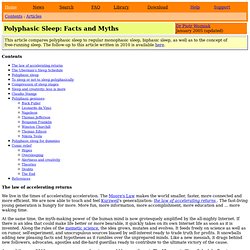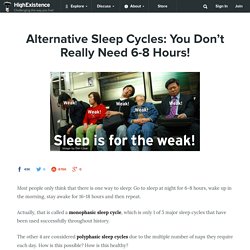

How to Reboot Your Sleep Cycle and Get the Rest You Deserve. The Power of the Sleep Cycle « Glen Rhodes. Ok, I’ve been talking to people for a long time about the fact that you can get by on 6 or even 4.5 hours of sleep per day without question.

The secret is NOT the amount of sleep, but rather the number itself; a multiple of 90 minutes will change your life. One thing I should mention, is that because we are analog beings, and not computers, that which could be 90 minutes for some people, might be 80 minutes for another, or 100 minutes for another; you will eventually learn the length of your sleep cycle by watching the times you naturally wake up and turn over, make a mental note of the time / interval. But assuming that 90 minutes is the average, these are the best lengths of sleep that will not make you feel groggy. The worst thing to do is wake up in the middle of a sleep cycle. 1.5 hours 3 hours 4.5 hours 6 hours 7.5 hours Those are the sleep quantities that you should aim to get, and those are what your body will naturally take, removing the alarm clock.
Understanding Sleep: Deep Sleep, REM Sleep, Cycles, Stages, and. The power of sleep Many of us try to sleep as little as possible.

There are so many things that seem more interesting or important than getting a few more hours of sleep, but just as exercise and nutrition are essential for optimal health and happiness, so is sleep. The quality of your sleep directly affects the quality of your waking life, including your mental sharpness, productivity, emotional balance, creativity, physical vitality, and even your weight.
No other activity delivers so many benefits with so little effort! Understanding sleep Sleep isn’t exactly a time when your body and brain shut off. The good news is that you don't have to choose between health and productivity. Myths and Facts about Sleep Myth 1: Getting just one hour less sleep per night won’t affect your daytime functioning. Myth 2: Your body adjusts quickly to different sleep schedules.
Myth 3: Extra sleep at night can cure you of problems with excessive daytime fatigue. Polyphasic Sleep. A couple days ago, I saw a post about polyphasic sleep on LifeHack.org. Since then I’ve been emailed about this topic as well, probably because I’ve written previously about becoming an early riser. Polyphasic sleep involves taking multiple short sleep periods throughout the day instead of getting all your sleep in one long chunk. A popular form of polyphasic sleep, the Uberman sleep schedule, suggests that you sleep 20-30 minutes six times per day, with equally spaced naps every 4 hours around the clock.
This means you’re only sleeping 2-3 hours per day. I’d previously heard of polyphasic sleep, but until now I hadn’t come across practical schedules that people seem to be reporting interesting results with. Ultradian Rhythms & the 20-minute Break. Findings Suggest That A Biphasic Sleep Schedule Not Only Refresh. Polyphasic Sleep: Facts and Myths. Contents The law of accelerating returns We live in the times of accelerating acceleration.

The Moore's Law makes the world smaller, faster, more connected and more efficient. We are now able to touch and feel Kurzweil's generalization: the law of accelerating returns . The fast-living young generation is hungry for more. At the same time, the myth-making power of the human mind is now grotesquely amplified by the all-mighty Internet. Around the year 2000, a new meme cropped up in several blogs on the net: The Uberman's Sleep Schedule. Alternate Sleep Cycles. Most people only think that there is one way to sleep: Go to sleep at night for 6-8 hours, wake up in the morning, stay awake for 16-18 hours and then repeat.

Actually, that is called a monophasic sleep cycle, which is only 1 of 5 major sleep cycles that have been used successfully throughout history. The other 4 are considered polyphasic sleep cycles due to the multiple number of naps they require each day. How is this possible? How is this healthy? Well the most important of every sleep cycle is the Stage 4 REM (Rapid Eye Movement) sleep, which has been shown to provide the benefits of sleep to the brain above all other stages of sleep. This way, you still get the benefits of 8 hours of sleep without wasting all of the time it takes to get to REM cycles, resulting in a much more efficient sleep cycle. Uberman Cycle: 20 to 30 minute naps every 4 hours, resulting in 6 naps each day. Everyman Cycle: One longer “core” nap that is supplemented with several 20-30 minute naps.
Dymaxion Cycle: